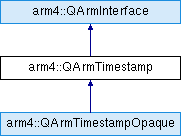arm4::QArmTimestamp Class Reference
[ARM 4.1]
is an abstract interface which is a superclass of specific timestamp formats. More...

Detailed Description
is an abstract interface which is a superclass of specific timestamp formats.
The following timestamp formats are known:
- QArmTimestampOpaque
- QArmTimestampStrings
- QArmTimestampUsecJan1970.
QArmTimestamp is abstract in the sense that any QArmTimestamp object returned by any method in this specification satisfies one of the subclass interfaces. The QArmTimestamp subclasses are used in situations in which the context of a transaction is not known when the transaction begins to execute, and for which there is a non-trivial delay before the context is known. ARM requires that the full context of a transaction be known when QArmTransaction’s start() is executed (because the correlator is generated at this time). In ARM 2.0 and 3.0 there is no way to capture any time spent processing the transaction before the context is known. ARM 4.0 introduced the concept of an “arrival time”. The arrival time is when processing of the transaction commenced. By default it is the moment in time when start() executes. If the delay between the start of processing and the execution of start() is significant, the application can capture the arrival time by creating an QArmTimestamp, setting the timestamp using set(), then associating it with an QArmTransaction using QArmTransaction’s setPrestartTimeValue(QArmTimestamp) prior to calling QArmTransaction’s start(). The following considerations influence the selection of which QArmTimestamp subclass to use:
- If the application can invoke ARM interfaces at the moment that processing of the transaction begins, use QArmTimestampOpaque. Calling QArmTimestampOpaque’s set() stores a timestamp with the current time. Note: The same result can be achieved by invoking QArmTransaction’s setArrivalTime(). The use of QArmTimestampOpaque provides more flexibility and is preferred. Beginning with ARM 4.1, setArrivalTime() is deprecated in favor of using QArmTimestamp, but setArrivalTime() must be supported by all implementations of ARM 4.x.
- If the application cannot invoke ARM interfaces at the moment that processing of the transaction begins, but can capture the current time through some other means, use either QArmTimestampStrings or QArmTimestampUsecJan1970, converting the captured time into the appropriate format.
- Since:
- ARM 4.1
The documentation for this class was generated from the following file:
- QArm4/QArmTimestamp


